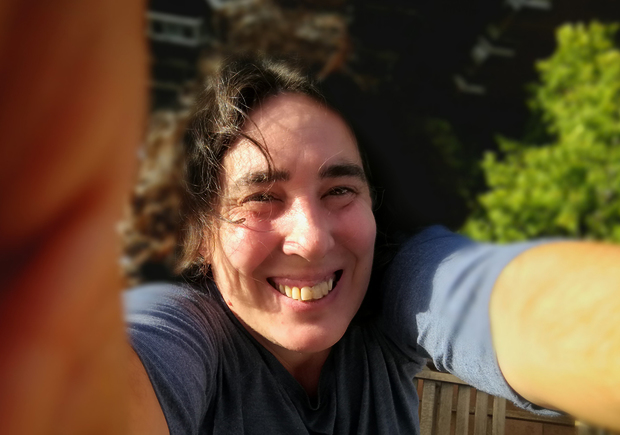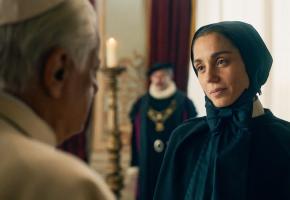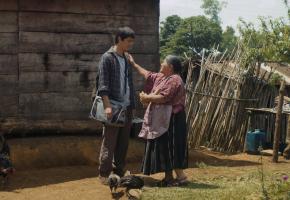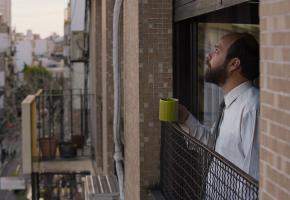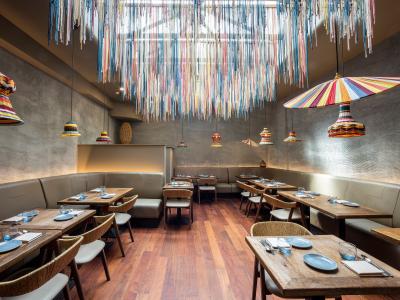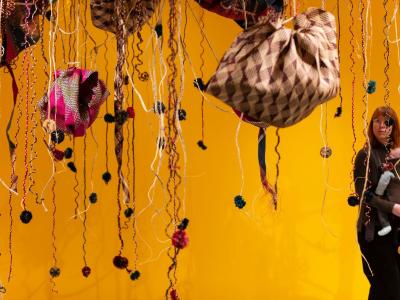First love is hard enough without the complications brought on by the pressures of life within a Roma community and Carmen and Lola are torn between their duty to their families and their own emotions. Arantxa Echevarría, inspired by a newspaper cutting about the first ever marriage between two gypsy girls, wondered how the love story between these two girls would have developed. She saw it as an important story that needed telling, immediately choosing to call them ‘Carmen & Lola’, as so many gypsy girls have those names: -
“I wanted the names to be a cliché to later tear those stereotypes apart”.
Echevarría is a highly motivated and compassionate person, when she started to research and delve into the heart of this community, she discovered that persistent racism still haunts these hard-working people, who continue to be treated like foreigners in their own land: -
“The gypsy has been in Spain for more than 600 years and yet the Spanish continue to be super racist… for instance, if you saw a gypsy coming towards you in the street, you would lower your gaze and if I were to tell my mother that I wanted to marry a gypsy, she would kill me! Yet they carry the flag of Spain and they are the proudest and most patriotic people in the country, but the world of the ‘payo’, or non- gypsy remains out of reach for them… I wanted to avoid the stereotype of the lazy gypsy who doesn’t work…[in reality] they get up at 5 in the morning to go to market, they are hard working and adore their families and in the end, everything they do is for love… yet, their culture never spreads beyond the borders of their area… they live according to their own rules, which are very different from ours… It is a highly patriarchal society and now, Evangelism has also crept in from South America, which is an ultra ‘machista’ religion. If the gypsy was primarily conservative, with this religion, this has become even more exacerbated.”
The gypsy cannot accept the ‘payo’ because, with all the logic in the world, we have persistently humiliated them and made their lives impossible. During the Franco period, they were even incarcerated with the lay abouts, homosexuals and miscreants and so, naturally, the gipsy has had a bad reputation since that time. The proof is that even now, only four months ago, in the new RAE (Real Academia Española) dictionary of the Spanish Language, the synonym for the word ‘gypsy’ was ‘swindler’. They are tarred with only negative connotations and little has changed.”
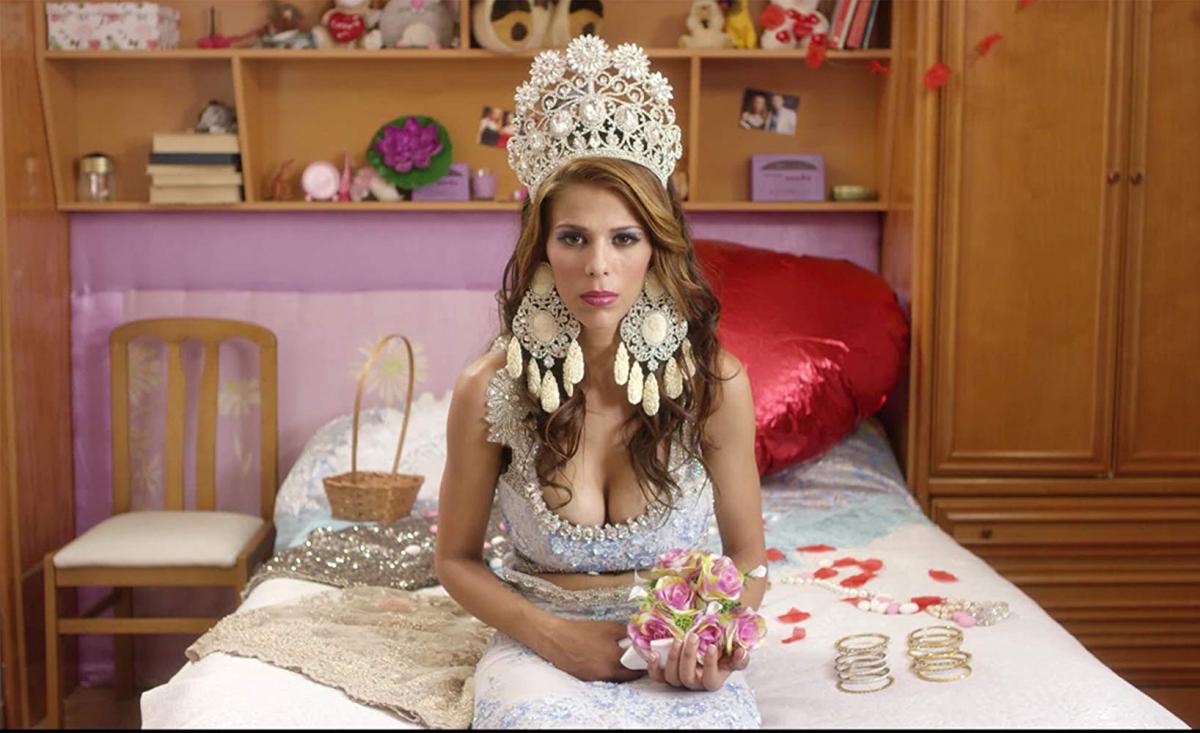
This dramatic love story disrupts the families involved. The young teenage Carmen (Rosy Rodríguez) has already been ‘promised’ and is destined to live like all her forbears, as a wife and bearer of as many children as possible. This patriarchal society is rigid and any challenge to the status quo is harshly rejected. But she is destined to meet the tomboyish Lola (Zaira Morales), who has dared to dream of studying at university, possibly becoming a teacher, and setting herself free. She is artistic, and enjoys drawing and painting, even if it has to be graffiti. When the two meet, there is an instant attraction that will revolutionize Carmen’s world.
The director Arantxa Echevarría has an eye for detail and there is much tenderness and sensuality in the burgeoning relationship, capturing their excitement, but also the growing awareness of what any liaison could mean for them in their community. Family ties and family honour are all and losing them is a terrifying prospect. Echeverría examines the traditions and exposes some of the hypocrisy. Carmen’s engagement ceremony to what appears to be an almost total stranger, has her wearing an over-the-top outfit, with a kitsch crown embossed with pearls and massive earrings. Coupled with this, are the exaggerated assertions of her father (the impressive Moreno Borja), who insists she never goes out alone and does not even own a cell phone, thus emphasizing the pressures of maintaining a level of honour, even if with lies, in that rigid patriarchy in which they all appear in some way to be victims of their own traditions.
“Gypsy society is very patriarchal, very ‘machista’ and this can be seen when the mother discovers that her daughter is a lesbian, the first thing she says is: “We must talk to your father… I cannot keep this secret, if your father doesn’t participate, we cannot continue... a ‘paya’ mother would have said [the opposite]. We will solve this between us and we will not talk to your father… but in that community, they have to bring it out and what is the first thing that the father says to the mother? “It’s all your fault!” Because it is the mother who educates the child, therefore, she is responsible… but note that there is no violence… there is psychological violence and there are threats, but I wanted to avoid the typical stereotype of the gypsy that is physically violent because, in fact, the ‘payo’ is much worse... but these families are profoundly bound by love and in the end, her father lets her go, even though he is a gypsy… he does banish her from the community but he allows her to go, opening a little door for her.”
It is no coincidence that one of the visual themes in the film are birds, Lola paints birds and they symbolize the freedom she yearns for, as in the final scene, the shot of the sea, a sea they have never seen before, a new horizon.
One of the biggest challenges for Arantza Echevarría was the casting of the two girls. The closed community would not even contemplate the subject matter, because as far as they were concerned it did not exist in their community. Her initial efforts to contact gypsy organizations went nowhere: “It was like trying to open a safe. Some suggested I get rid of the script entirely and start again”. There were girls who admitted they would have loved to take part in the film but they knew that if they did, they would never be able to marry.
Echevarría then had a brainwave that helped her open doors that had been so firmly closed, not only because she was a ‘paya’ but also because she wanted to deal with a subject that was strictly taboo. She chose to search through social media. The anonymity opened many channels, and she found an LGBT site, similar to the one called ‘Gitana Guapa’ (Attractive Gypsy) that was in the movie: “I started chatting with the girls on the site. Then one day one asked me, which family do you come from? This was exclusively a gypsy question, they ask about your heritage… so I lied and said my name was ‘Heredia’… a gypsy name. She then asked how it was for me, did my parents know? What had they done to me? Was I grounded? Had they cut my hair? Had I been banished?... and eventually I had to tell her the truth: No I am a ‘paya’, I am a film director and I am writing about this subject. It took two years in the end, and she put me in touch with other girls to whom I sent the script and they helped me with it, telling me what to cut out: “…this is ‘payo’ stuff… this is ok, this is not…”
There was a moment when Echevarría thought she would never find her protagonists, she then found Lola, but could not find a Carmen. No one would dare to take the part. These are girls who have no studies, if they are banished from their communities, they are exposed to the non-gypsy world which is very racist and as illustrated in the film… they would find it hard to even get a job. These are girls who have had little or no adolescence, from the early ages of 14 or 15, they are already ‘sexualized’… they are dressed up with painted lips and they play at being mothers. If they meet a lad they like and are seen together, they cannot risk a bad reputation and are obliged to formalize it with an engagement. In the ‘payo’ world, you can go out with a young friend or boyfriend and nothing happens, but in the gypsy community a good reputation is all, no one can afford to lose it. If someone comes ‘out’, it has, at times, led to forced marriages to salvage the family honour and reputation at all costs.
“But, if you are happy to conform to the rules, then you would be the happiest person in the world, because the family would love you and the community would always be there for you… they would always protect you and care for you… but if you should not want to be there [it would be a very different story].”
Rosy Rodríguez who plays Carmen has been married since she was 16 years of age, and Zaida Morales (Lola) was 16 when they started filming. Echevarría was delighted to find that they had a spontaneous chemistry and, after they rehearsed together for over a year, they developed the natural familiarity and warmth that was so essential to their roles. She was also concerned to make sure that the repercussions of their participation would be minimal: -
“I told them I would need to explain the situation to their parents to avoid grave consequences… so I sat with the parents and they said: If it were two blokes, then we would have said NO, right away. We couldn’t have a son who turned out to be a poof, but two girls?… We don’t care.”
All the actors in the film bar one (Carolina Yuste, who played Paqui), are gypsies. Interestingly, Moreno Borja, who plays the father has turned out to be an excellent actor, so Echevarría recommended him to her friend Paco (Francisco León Barrios) who was filming a series about gypsies and searching for actors. Borja was so successful that he has become a full- time actor and is now playing in another film called “The Plague”, giving up his job as a security guard.
Echevarría is a bubbly, enthusiastic and energetic person, she has worked tirelessly with her actors to enable them, without any previous formal training, to inhabit their characters with conviction. She found events and experiences in their real lives that they could relate to, in order to achieve the right depth of emotion for a scene: -
“ The mother, played by Rafaela León has a complicated role, For example, the body language is amazing… she is a woman who is 42, although she appears older and so, in the sequence when she discovers Lola’s letter for instance, we couldn’t get it right in rehearsal. It’s a very emotional scene and when you’re actually shooting, everything is magnified and intensified… so we left this scene to the end, and did it in one take. These are actors who have no access to the usual tools, so what they have to do is really get into the role and become genuinely emotional… so, as I knew she had a son that she adores, who is called Samuel, I told her to imagine that he had come home and told her he could never give her any grandchildren… and that is a profound anguish for a gypsy… she was able to hang on to that…”

Finance was not easy to find, because most companies wanted to replace the gypsies with well-known actors and celebrities. Echevarría staunchly refused to compromise, and fortunately a French mobile phone operator helped out: -
“ORANGE has a boss who is quite mad and he had been following my work through my short films and documentaries and he called [out of the blue] and asked us if we had any projects in mind. When I told him about the script, he said he loved the idea and would help out with the funds.”
Orange is to be commended as they also sponsored the BAFTA awards for 12 years. from 1997- 2009. Orange UK was originally launched in 1993. In 2000, it was purchased by France Télécom and is now known as Orange S.A.
The whole cinematic experience has been a true eye-opener for the two actresses. They were quite overwhelmed when the film was invited to participate in the Cannes Director’s Fortnight.
“These are two girls who had never gone out of Spain and I said to them, we will be there for a week… I will buy you clothes... and they said, but where is it? France, I said. Oh NO! they replied …we won’t go on a plane!... so, I took them by car. Imagine them, both lovely looking girls on the red carpet, people would stop them and ask for autographs and take photos, they couldn’t believe it. Especially when you think that Lola is a hairdresser and Carmen a married woman and there they were in the middle of a première and when the film finished, the spotlights lit them up and the applause lasted 4 minutes. The girls just burst into tears and cried and cried… all the while worried that somehow they would have to pay for all they were getting.”
When Echevarria explained to the girls that it was all for them and asked them why they cried, Rosy Rodríguez replied:
“I have never been valued in my life and suddenly there are people who can ‘see‘ you and applaud you for work that you’ve done… but also because the film is now finished, and I must now return to my real life again.”
This is a film that has sparked many reactions and is being very well received. Carmen & Lola has opened a few more doors and challenged a few more traditions. In Ljubljana in Slovenia, they are establishing an LGBT festival to which Echevarría is planning to send her film: -
“Give more women the opportunity and the voice to make good films. The Best Film at the Goya Awards this year was directed by a woman (The Bookshop 2017 by Isabel Coixet) with Bill Nighy and Emily Mortimer… if you ask for 5 thousand euros to make a film they say: Ah, yes, of course, a woman … a small budget… an intimate film …
No, no, no! Give me 10 Million and I will make you a blockbuster!”
Carmen & Lola (2018)
Writer/ Director Arantxa Echevarría
Producers: Eduardo Santana / Arantxa Echevarría/ Pilar Sánchez Díaz.
DOP: Pilar Sánchez Díaz
Cast: Zaira Romero, Rosy Rodríguez, Moreno Borja, Rafaela León, Carolina Yuste.


